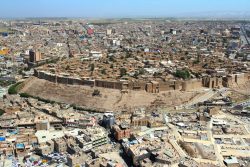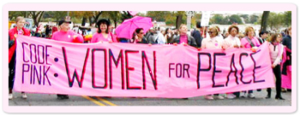CodePink Travels to Iraq

CodePink is traveling to Iraq to work with the Christian Peace Teams (CPT) an international organization set up to support teams of peace workers in conflict areas around the world. The CPT team is currently focusing on the internally displaced persons (IDPs) of the Pshdar district. Since 2011, it has been estimated that over 16 million people have been displaced from Syria and Iraq due to civil war and sectarian violence. Over 2 million refugees and (IDPs) have fled their home towns and countries, and have found refuge in Iraqi Kurdistan. According to the Kurdistan Regional Government (KRG), refugees and IDPs now represent 28% of the Iraqi Kurdistan’s total population. A number of them are settled in 38 camps, while the rest, which are the majority, are living in the cities and town in the Kurdistan Region. At the same time, the Kurdistan Region hosts more than 97 percent of all the Syrian refugees in Iraq.
Pshdar district is situated in the rugged Qandil mountains, part of the Zagros mountains range, in the northern part of Sulamaniya governorate which is under the administration of the Kurdistan Regional Government (KRG). Pshdar borders the Islamic Republic of Iran and its northernmost point lies approximately 80 km (50 miles) south of the Republic of Turkey’s border and provide homes to hundreds of Kurdish villages and seasonal grazing grounds to local shepherds. Some areas of the Pshdar district are also used by guerrilla fighters of PKK ( Kurdistan Worker’s Party) who carry out military operations against the government of the Republic of Turkey and PJAK (Party for a Free Life in Kurdistan) who is at war against the government of the Islamic Republic of Iran. These conflicts has raged for over two decades, killing nearly 40,000, displacing over a million Kurdish civilians in Southeast Turkey and thousands more inside Iraq. Turkey and Iran use the presence of guerrilla fighters as a reason to bomb and shell the villages and their surrounding areas; however, the guerrillas have their own camps and bases and do not live in the villages that bear the brunt of the military action.

CPTers have traveled along the entire northern border interviewing internally displaced persons (IDPs) and exploring possibilities for a project to accompany people who are returning to villages from which they fled. The team has kept regular contact with the United Nations and local Kurdish NGOs that have assisted these IDPs. In some areas they’ve been able to visit the remains of Muslim and Christian villages destroyed by the Turkish bombing and talk to villagers who still live there or come and go to care for crops or animals under the threat of further random attacks. They interviewed a 27-year old woman who lost her leg, families of persons who were killed in these bombings by Turkish military, and people whose family were taken from their villages and allegedly tortured by Turkish soldiers. Testimonies of villagers and government officials have confirmed the destruction of civilian infrastructure such as homes, schools, mosques, churches, and hospitals. Turkish and (and also Iranian) bombing has killed an extensive amount of sheep and cows and scorched villagers’ agriculture. The Turkish military has bombed bridges and planted land mines, cutting people off from harvesting their crops. Bombing continues in areas still inhabited and is audible from some areas where IDPs now live. CPTers have also seen 12 of the numerous Turkish military bases positioned well within Iraqi territory. According to villagers and Iraqi Kurdish security officials, Turkish military at these bases watch their movements, set up checkpoints, strike during the time of planting and harvesting or anytime they observe displaced villagers returning to their homes, and burn agricultural fields for the purpose of “visibility.” Locals experience the Turkish presence as an oppressive occupation.
Despite not having its own formalized country or state, Iraqi Kurdistan’s population of 5.2 million has opened their arms to hundreds of thousands of displaced families of different religions and ethnicities, providing housing, water and electricity services, and constructing schools, health centers, and trans- port offices. Mosul’s IDPs has risen to 164,000.

Iraq’s 2005 Constitution recognizes an autonomous Kurdistan region in the north of the country, run by the KurdistanRegional government. This was the outcome of decades of political and military efforts to secure self-rule by the Kurdish minority, who are estimated to number more than 6 million and make up between 17% and 20% of the population of Iraq. Between 25 and 35 million Kurds inhabits a mountainous region forming a wide arc from eastern Turkey and the northwestern part of Syria through Soviet Azerbaijan and Iraq to the northwest of the Zagros Mountains in Iran. About half of all Kurds worldwide lived in Turkey. Most of the rest lived in adjacent regions of Iran, Iraq, and Syria. They make up the fourth-largest ethnic group in the Middle East, but they have never obtained a permanent nation state. Only in Iraq have they managed to set up a stable government of their own in recent times, albeit within a federal state.
The capital and the seat of the Kurdistan Regional Government is Erbil, a city known in Kurdish as Hawler. The Citadel in Erbil is considered the world’s oldest continuously inhabited settlement. The next largest cities are Slemani and Dohuk. Slemani is the KRG’s official English spelling, but it can also be found with other spellings such as Sulaimani, Suleimani, Sulaimaniyah, and Suleimaniah. The Kurdistan Regional Government exercises executive power according to the Kurdistan Region’s laws as enacted by the democratically elected Kurdistan Parliament. The current government, led by Prime Minister Nechirvan Barzani, assumed office in the spring of 2014.

The Citadel in Erbil
City of Slemani.

CodePink part of CPT’s delegations will be based in Sulaimani. Delegates will meet with representatives of non-governmental organizations, human rights groups, displaced persons, and government officials. They will gain a perspective on the challenges facing people in northern Iraq and the impact of the violence in other areas of Iraq and along the borders of the KRG. The delegation will participate in the work of CPT’s longer-term project of reporting on human rights abuses to the international community and supporting local reconciliation.
CodePink joins its voice with CPT, and its Kurdish partners to call for dialogue between all parties involved. We call for a peaceful solution. There is no military solution!


Sources:
BBC News.
Wikipedia.
KRG Homepage.
Christian Peace Teams.









Leave a Reply
You must be logged in to post a comment.